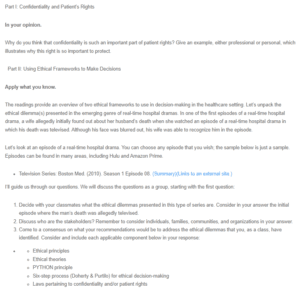Ethics Law Discussion
Part I: Confidentiality and Patient’s Rights
Confidentiality is an important aspect of nursing practice. I think it is an important part of a patient’s right because patients trust us with so much information that aids in their treatment, and compromising their confidentiality can lead to patients losing trust in their healthcare providers. For instance, I once came across a patient who tested positive for Human Immunodeficiency Virus, and he didn’t want his status to be disclosed to his relatives. The patient presented with an opportunistic infection that left his relatives wondering. By disclosing such information to relatives, the patient would have been predisposed to social stress, which would interfere with his healing process. Such sensitive information should, therefore, remain a secret between the patient and the healthcare provider.
Part II: Using Ethical Framework to Make Decision
The most outstanding ethical dilemma in this series is ethical decision-making and autonomy. For instance, in episode 8, the healthcare workers are faced with a challenging situation to decide between doing a face transplant and a heart transplant. With a deformed face, one can lead a normal life, and hence, the transplant is cosmetic rather than therapeutic purpose. On the other hand, the heart is a vital organ, and if defective, it is almost incompatible with life. Therefore, while considering the urgency between the two, a heart transplant is more urgent and important. However, finding a heart donor isn’t easy because most patients presenting to the hospital have heart issues. From the previous episode, where the man’s death was televised, the most outstanding ethical dilemma is the maintenance of the patient’s autonomy. The patient’s consent was taken before his death. However, his identity was hidden, and so no external person apart from his next of kin would realize it. It is, therefore, confusing as to whether the wife’s decision or the deceased decision matter. While making such tough decisions, it is important to consider stakeholders such as first-degree relatives and spouses (Marrone, 2016). However, when the patient is an adult, it is upon them to make decisions, and their choices should be respected whether or not the relatives agree.
In advancing a complex healthcare system, healthcare providers make decisions that are life-changing for clients and patients. The decisions determine the outcome, whether death or life, especially for patients with chronic diseases. Therefore, their healthcare workers should apply the six steps of the decision-making process before making a final decision. The steps in the process allow for interrogation of the situation while considering the consequence of the decision to everyone, including emotions. Due to such ethical dilemmas, healthcare professional bodies have ethical principles guiding decision-making in difficult situations. We, therefore, recommend that the principles should be put into practice to avoid medico-legal issues in such situations. Finally, healthcare workers should strictly adhere to laws about confidentiality and patients’ rights (Stanford & Connor, 2019). For instance, in the episode concerning a man’s death televised, following the laws would not cause such serious emotion that happened to the man’s wife. In summary, it is important to acknowledge that healthcare is patient-centered, and we are obliged to serve them with dignity.
References
Marrone, S. R. (2016). Informed consent examined within the context of culturally congruent care: An interprofessional perspective. Journal of Transcultural Nursing, 27(4), 342. https://doi:10.1177/1043659615569537
Stanford, C. C., & Connor, V. J. (2019). Applied Law & Ethics for Health Professionals. Jones & Bartlett Learning.
ORDER A PLAGIARISM-FREE PAPER HERE
We’ll write everything from scratch
Question

Ethics Law Discussion
Part I: Confidentiality and Patient’s Rights
In your opinion.
Why do you think that confidentiality is such an important part of patient rights? Give an example, either professional or personal, which illustrates why this right is so important to protect.
Part II: Using Ethical Frameworks to Make Decisions
Apply what you know.
The readings provide an overview of two ethical frameworks to use in decision-making in the healthcare setting. Let’s unpack the ethical dilemma(s) presented in the emerging genre of real-time hospital dramas. In one of the first episodes of a real-time hospital drama, a wife allegedly initially found out about her husband’s death when she watched an episode of a real-time hospital drama in which his death was televised. Although his face was blurred out, his wife was able to recognize him in the episode.
Let’s look at an episode of a real-time hospital drama. You can choose any episode that you wish; the sample below is just a sample. Episodes can be found in many areas, including Hulu and Amazon Prime.
- Television Series: Boston Med. (2010). Season 1 Episode 08. (Summary)(Links to an external site.)
I’ll guide us through our questions. We will discuss the questions as a group, starting with the first question:
- Decide with your classmates what the ethical dilemmas presented in this type of series are. Consider in your answer the initial episode where the man’s death was allegedly televised.
- Discuss who are the stakeholders? Remember to consider individuals, families, communities, and organizations in your answer.
- Come to a consensus on what your recommendations would be to address the ethical dilemmas that you, as a class, have identified. Consider and include each applicable component below in your response:
-
- Ethical principles
- Ethical theories
- PYTHON principle
- Six-step process (Doherty & Purtilo) for ethical decision-making
- Laws pertaining to confidentiality and/or patient rights
Required Reading
Textbook
Stanford, C. C. & Connor, V. J. (2019) 2nd edition. Chapter 3: Vulnerable Populations, p. 32-49 and Chapter 4: Confidentiality, p.53-68, In Ethics for health professionals. Burlington, MA: Jones & Bartlett Learning.
Online Articles and Resources
Marrone, S. R. (2016). Informed consent examined within the context of culturally congruent care: An interprofessional perspective.(Links to an external site.) Journal of Transcultural Nursing, 27(4), 342. doi:10.1177/1043659615569537
-
- English, A. & Lewis, J. (2016). Privacy protection in billing and health insurance communications.(Links to an external site.) AMA Journal Of Ethics, 18(3), 279.

